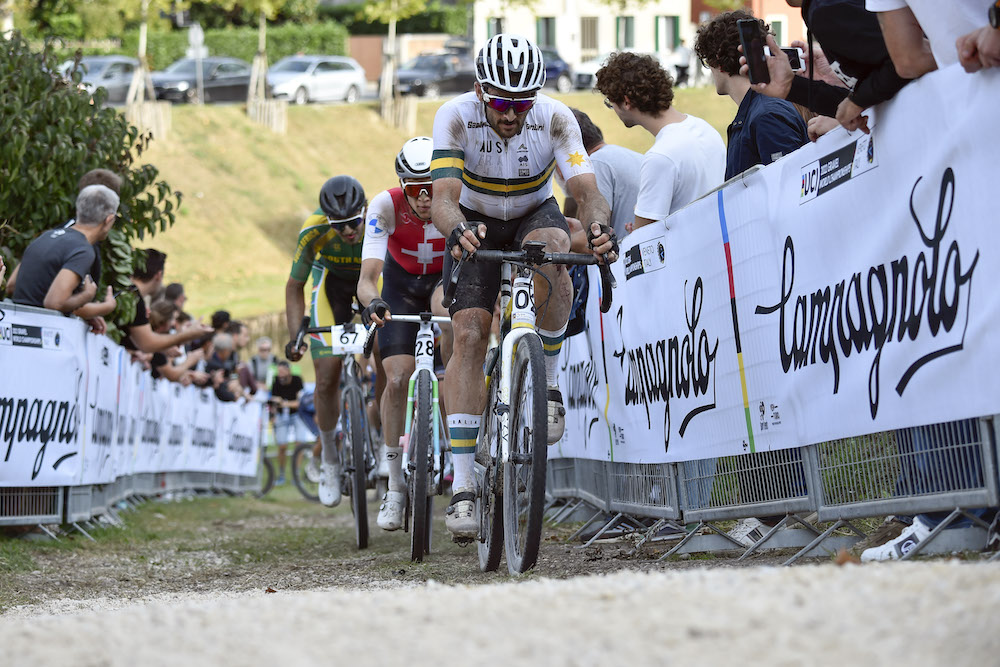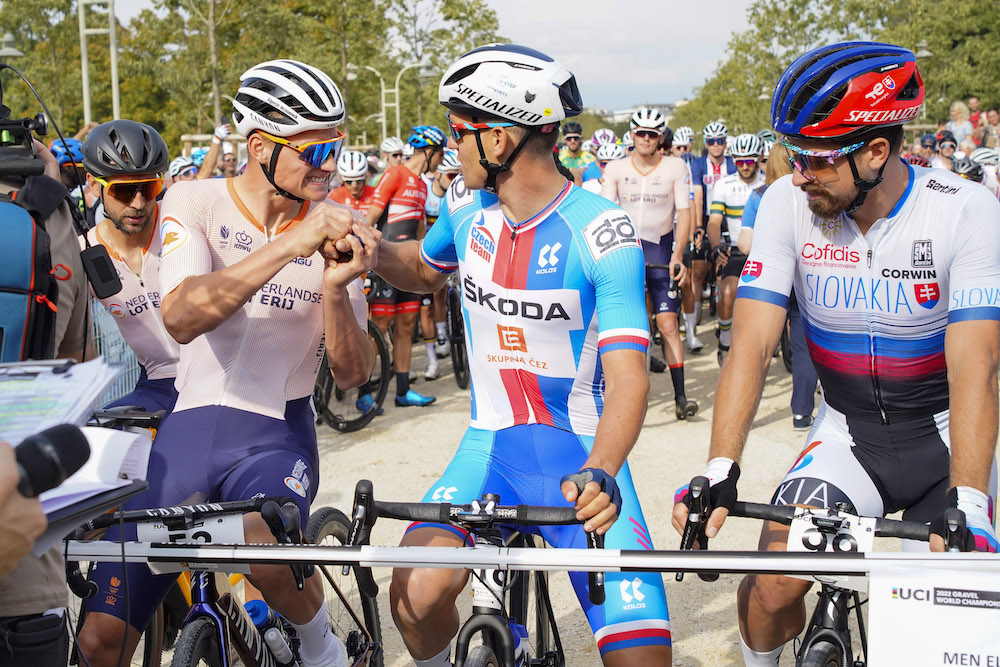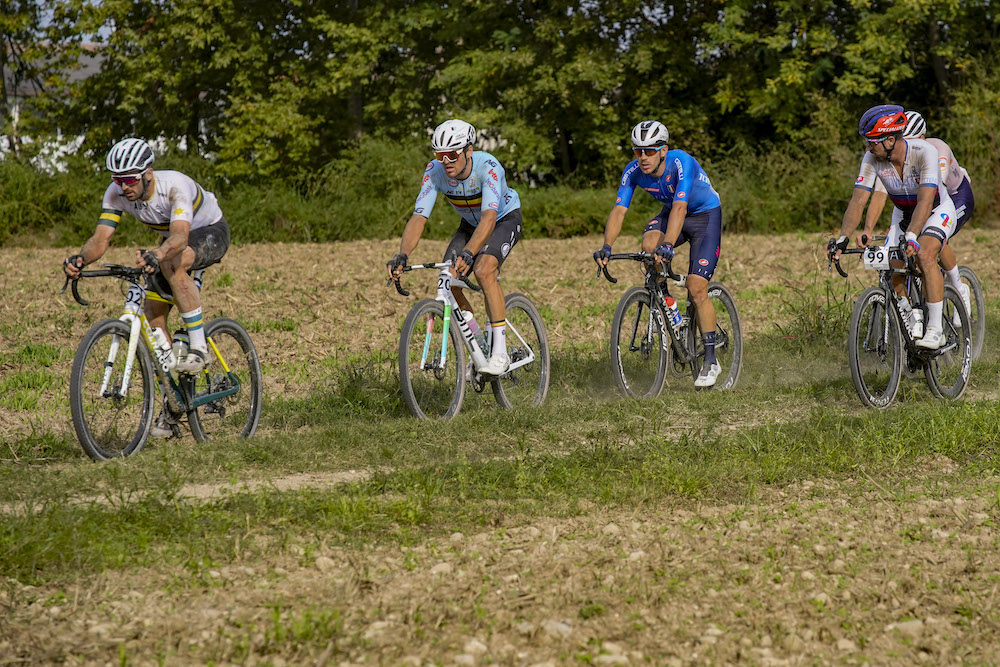Nathan Haas blog – What's the point(s)? Unpacking Gravel World Championships
My first impressions were not good, but I finished up with a grappa in my hand and a smile on my face

I’m sitting in a small town less than an hour from where we finished the race in Cittadella, Italy, nestled into the back corner of an old stone-built homestead restaurant. Sipping the last of my after-dinner grappa, this traditional digestivo seems the perfect pairing to digest the event I’d just ridden; the first moment to reflect, to zoom out, and to try and make sense of the first ever UCI Gravel World Championships.
Perhaps it's the overzealous pours of wine, perhaps it's the warm hug you feel from the incredible bigoli - a favourite pasta of mine - or perhaps it's the buzz from the grappa. Who’s to say? But I find myself sitting here with a smile.
It's a smile that transcends the moment, one that belongs to a mood that began to take shape from the early hours of that morning, one that could only have been inspired by the experiences of that day.
Had all my biases and preconceived notions of the UCI Gravel Worlds been wrong? Was this smile my way of acknowledging that I was perhaps a bit hasty in pre-judging the event?
It had been a big day on the bike.
I started out with a crash inside the first 30k, which I later learned broke my pinkie finger, but I wasn’t giving up that early and fought back up. As the kilometres rolled by, two escapees went clear of the main pack gained an advantage of over five minutes - a significant lead on-off road parcours.
We raced, we yo-yoed, we fought, and eventually the winner came from that group of two off the front. I placed 16th, a result I can say I’m proud of. I left nothing in the tank, finishing my first full gravel season at a new, different event.
Re-wind 24 hours and, in all honesty, things did not start on a good note.
At the technical meeting we learned that the WorldTour riders, most of whom had never even ridden a gravel bike, were given, based on their fame and road rankings, the front row at the start. Yes, the start of the GRAVEL World Championship. Priority was also given to mountain bike and cyclo-cross riders as, it was argued, they too have UCI points.

And what about the gravel riders? As it turned out, the UCI's Gravel World Series, which myself and many others had built our seasons around, and which even formed the basis of a qualification system for Worlds, carried no ranking and no points. We were told we would be starting at the back of the field.
The overwhelming sentiment from the gravel community was that our sport had been highjacked
Nico Roche broke the internet that evening with a tweet explaining this, and the overwhelming sentiment from the gravel community was that our sport had been highjacked. We'd been thrown to the side for the big names who only qualified by national selection and then took the limelight in the big moment - the moment built by those actually invested in the sport.
Alas, this was rectified, and a few of the gravel riders took to rows two and three of the grid. But still, I don’t know how to feel about that. I mean, Tom Pidcock is the MTB Olympic champion, and he was started in position 70 at this year's MTB Worlds due to his lack of UCI MTB points. I know that big names might get start money, special perks, and VIP treatment around the race, but it should all be equal between the start and finish lines, if you ask me.
10 against ones
So let's talk about those wildcard riders. To be honest, I’m totally on board with some star names coming. A rising tide, like I’ve said before. I’m always happy to test my legs against the fastest guys in the world, and just as happy to lose. But maybe, just maybe, there was just a bit too much weight on these wildcards, on nations selecting whoever they wanted.
Let’s look at the Italian team. In the mens race there were ten - TEN! - riders. The maximum at Road Worlds is eight (nine if you have the reigning champ). So why are we having even bigger teams here?
The 10-man Italian team turned out to be one big unit, racing against individuals
What's more, the Italians were all road riders. The best dedicated gravel rider from Italy is undoubtedly Mattia De Marchi. He’s won multiple major races over the last few years - including the Traka, Badlands, Ranxo and more - but he wasn’t given a spot for the elite race, as they opted to take a full road 'pro’ team.
Mattia still raced his age-group category because, well, he’s a hero and wasn’t going to miss it, even if he wasn’t competing against us. Hats off to that class move. But it was a real shame for him that he didn’t get to compete in the category where he belongs, and really did earn a place in.

The 10-man Italian team turned out to be one big unit, racing against individuals.
The Australian team, for instance, had five guys, but the first time we saw each other was on the start line and we had no infrastructure or support as a group. We even had to buy our own National KIT! No complaints, it is what it is, but it makes it really hard to be competitive.
Although missed on the TV coverage, myself, Carlos Verona and Nico Roche spent endless energy in the first 120k attacking and trying to bridge up to the two leaders. Every time we tried, we were blocked by the remaining nine riders of the Italian team, protecting the position of Daniel Oss up the road.
I might have had PTSD flashbacks to many, many, years of Road National Championships in Australia, where it was every individual against GreenEdge.
A solution
The thing is, there’s a pretty simple solution to this.
I would suggest to the UCI that they reduce these wildcard spots down to five per race per country. At the same time, add in qualifying points for the UCI gravel races. Not only would this encourage more of the dedicated gravel riders to come, it would result in a more balanced and authentic race.
All told, the UCI really put on a stellar event. It’s big, it’s flashy and it’s incredibly hard.
Let’s acknowledge that if gravel is a separate discipline, then we should treat it as such and give it the respect it deserves
Despite all my above reckonings, I bloody loved racing it. I would have loved a top-10, or even that elusive podium, and I’ll try again next year. It will still be an incredible challenge, but what better platform to go all out for?
Let’s just give it a few tweaks, and really acknowledge that if gravel is a separate discipline, then we should treat it as such and give it the respect it deserves. Yes, the marquee names could still come, but hopefully no specialists would be left behind.
But should we leave this up to someone else? I’m thinking over here on my Cyclingnews blog that I’ll start to include some stats on gravel rankings, based on the MTB model. I mean, it might not mean anything, but if nothing else maybe the federations would take note.
What does everyone think? Completely unofficial of course. Let us know in the comments…
Get The Leadout Newsletter
The latest race content, interviews, features, reviews and expert buying guides, direct to your inbox!
Nathan Haas turned his back on the WorldTour to dive into world of gravel. After a decade at the top echelon of professional road racing, the Australian is answered the off-road call in 2022, teaming up with Colnago to race and ride as a privateer on the burgeoning global gravel scene. He'll be documenting his experiences for Cyclingnews along the way, in his own inimitable style.